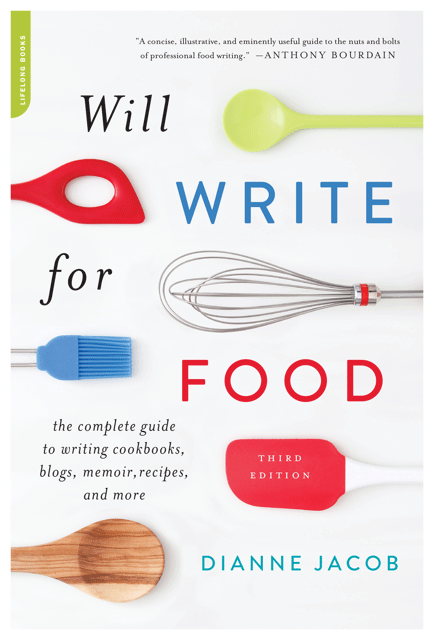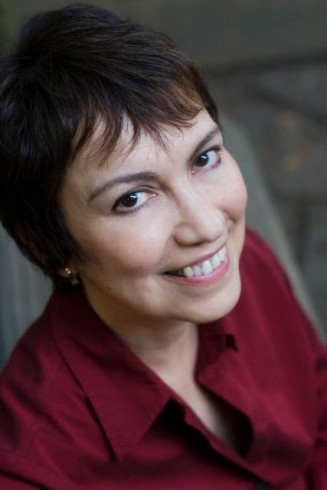Nearly ten years ago, I read Dianne Jacob’s book, Will Write for Food, after purchasing it from the Writer’s Digest catalog. It has become one of my favorite writing books, surviving year after year of ruthless culling of my bookshelves. I reviewed it then in my brand new blog, and it’s a bit staggering to look back on that post, as both I and my blog have aged an entire decade.
I’m still here, and I still enjoy sharing great books and writing resources. In 2009, Dianne Jacob entered the world of blogging as a way to update her book, and you can keep up with her at Will Write for Food.
Because of vast changes in the world of print and digital writing, Dianne Jacob’s new edition has been extensively revised to reflect current media trends. I enjoyed this 2015 release and found it brimming with practical advice for bloggers and photographers, as she offers a smorgasbord of ideas on how to become a professional in the field. That is, how to make money from your food writing.

In her introduction, Dianne Jacob shares:
Much has changed in the world of food writing since 2005, most notably in the widespread acceptance of blogging. Ten years ago, bloggers had barely emerged, and the print world did not respect them. Since then, a national food magazine asked a food blogger to write a monthly column…a food blogger got a show on the Food Network…more than a hundred food bloggers have book deals, and a few make a six-figure income. Learning good photography, social media skills, and self-promotion has become as important — maybe more so, if I’m being honest — than being an excellent writer.
Whether you’re a gourmet food aficionado or simply enjoy sharing your love of cooking through recipes and personal photography, this book has something to offer you. After devouring this new edition, I learned the field of food writing is still wide open, and if you have a passion for food writing, this book can help take you to the next step of becoming a professional.
Here are a few ways you can break into the huge market for food writing:
Start a Food Blog
If you’ve ever dreamed of writing a book, the best place to begin is by creating a blog. Then you can start immediately in finding your voice and audience, which will build your platform as an expert in your field. Chapter 4 of Will Write for Food is completely devoted to helping you get started. Jacob has interviewed dozens of successful food bloggers and shares their tips to help you.
Become a Better Photographer
Food writing works in sync with beautiful photography. Jacob explains, “Since the web is such a visual place, this is the best way to increase views. Of course it isn’t easy, but having terrific photos can propel a food blog to stardom.” She includes many practical ways to make your photo shoots look more professional.
Master the Art of Recipe Writing
“A well-written recipe is like poetry,” says Jacob. “Agents and editors can see a good one a mile away.” Who knew there was such an art to writing down your recipes? There is, and chapter 8 explains how you can become a master of the art. She includes a list of powerful action verbs that will bring your recipes to life. I especially enjoyed reading about how Julia Child captured the attention of legendary editor Judith Jones because of her strong knack for punchy verbs.
Compile a Cookbook
The world of cookbook writing has changed drastically in the past decade. Cookbooks are full of stories, which help grab a reader’s attention. “Many people read cookbooks in bed as though they were novels,” Jacob says. “They provide escape from daily life and a source of guiltless pleasure.” I confess I’ve done this very thing. I love reading descriptions of food, and especially the narratives behind them. Many magazines and websites have created sections to showcase the stories behind recipes. My favorite is Guideposts.
Write a Food Memoir
Ah… I love food memoirs. When I traveled to Tampa a few years ago to get a behind-the-scenes glimpse of the egg industry, I found myself spending the weekend with strangers who had one main topic in common: we loved reading and writing about food. So we discussed our favorite food memoirs, as we dined on scrambled egg burritos on the bus ride to tour egg farms. My all-time favorite food memoir is Julia Child’s My Life in France, which was co-authored with her nephew, Alex Prud’Homme. Julie and Julia sprang from the original, and I’m also a fan of farm-to-table memoirs such as Kristin Kimball’s The Dirty Life. There’s a never-ending market for weight-loss stories and recipes, and I reviewed Heidi Bonds’ Who’s the New Kid? here. Dianne Jacob devotes all of Chapter 9 to “Crafting Memoir and Nonfiction.”
Create Fiction Infused with Food
I love it when I’m reading a novel infused with descriptions of food. I can’t help it. I learn so much about characters and setting by visualizing meals in the story. Jacob writes, “In fiction, food is a device that helps you develop characters based on how they cook, which foods they like, and how they eat. It also creates a mood or sets a scene, and establishes the time.” Many fiction authors today include recipes, and several books I’ve reviewed have inspired me to try out a recipe I’ve discovered, such as Eva Marie Everson and Linda Evans Shepherd’s The Potluck Club and Cyndy Salzmann’s Friday Afternoon Club cozy mystery series.
I hope you get a chance to read Will Write for Food, and if you collect trade books on writing, this is one you’ll want to acquire for your shelves. Reading the updated edition ten years after the first has me focused less on myself and more on how I plan to incorporate food writing in my English/Language Arts classroom. I can’t wait to see what kinds of recipes and stories my teen students come up with. Maybe we’ll even compile a classroom cookbook or break into food blogging. The opportunities for sharing a love of good food and writing are endless!

About the Author:
Dianne Jacob is a popular speaker at food writing conferences and workshops in America and around the world. She judges for both the James Beard Foundation annual cookbook awards and the IACP annual cookbook awards. The coauthor of Grilled Pizzas & Piandinas and The United States of Pizza, and the writer of The Good Pantry, she lives in Oakland, California. She can be reached at her website and blog, where she covers food writing trends, issues, and technique.
Note: I received this book, complimentary, from the publisher for the purpose of review.





